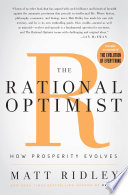Part 1
The Amazing Story of Human Progress: How We Got From Caves to iPhones
Imagine a world without electricity, cars, or even clean water. Hard to believe, right? In "The Rational Optimist," Matt Ridley takes us on a journey through history to show how we went from living in caves to having smartphones in our pockets. He argues that our incredible progress isn't just luck; it's the result of something amazing: the way we humans exchange ideas and things with each other. He calls this "exchange."
Think about it: you probably wouldn't be reading this if people hadn't shared their knowledge over centuries. Scientists built on the work of other scientists, inventors improved on earlier inventions, and teachers passed on skills to students. This isn't about one genius inventing everything; it's a giant, collaborative effort.
Ridley uses the example of the humble potato. Originally from South America, the potato was a relatively unknown food until it was brought to Europe. Suddenly, farmers had a new crop that could feed many people, leading to a population boom. This wasn't just about the potato itself, but about the *exchange* of the potato from one part of the world to another. This is a simple example of how the exchange of goods and ideas has propelled human progress.
He also talks about how specialized skills and jobs came about through exchange. Imagine a small village where everyone tries to do everything themselves: farming, building houses, making clothes, etc. It would be slow and inefficient. But, if people specialize – one person becomes a farmer, another a builder, another a tailor – they can each become incredibly skilled at their job. Then, through *exchange* (trading their goods or services), they all benefit from each other's expertise. This is called the "division of labor," and it's incredibly powerful.
Think of building a LEGO castle. If one person tries to build the whole thing by themselves, it would take forever and probably wouldn't be very good. But if you have a team, where one person specializes in building the towers, another the walls, and another the drawbridge, you'll build a much better castle, much faster. That's the power of specialization and exchange!
Ridley explains that this exchange isn't just about physical things like potatoes and LEGO bricks. It's also about ideas. When people share their knowledge, inventions, and innovations, progress accelerates dramatically. He points to the printing press as a prime example. Before the printing press, books were painstakingly copied by hand, making them expensive and rare. The printing press allowed for the mass production of books, spreading knowledge and ideas far and wide, leading to the Renaissance and the Scientific Revolution.
The book also touches upon the importance of trust in this process. Exchange only works if people trust each other. If you don't trust that the farmer will give you bread in exchange for your clothes, you won't trade. This trust is built over time through social interactions, laws, and institutions. A society with strong institutions and a culture of trust will see much faster progress than one that lacks these things. Think about it – you wouldn't buy something online if you didn't trust the seller or the payment system!
Ridley uses numerous historical examples to support his argument, from the development of agriculture to the Industrial Revolution. He shows how each step forward – from the wheel to the internet – was built upon previous exchanges of goods, services, and ideas. He even explains how seemingly negative events, like wars, can sometimes lead to surprising advancements through the sharing of knowledge and technology between competing nations.
The book is a celebration of human ingenuity and collaboration. It's a reminder that progress isn't predetermined; it's something we create together through our ability to exchange and share.
Lesson
Human progress is not about individual geniuses, but the collective power of exchange – the sharing of goods, services, and ideas. Specialization and trust are key ingredients in this process, leading to greater efficiency, innovation, and prosperity for everyone.
